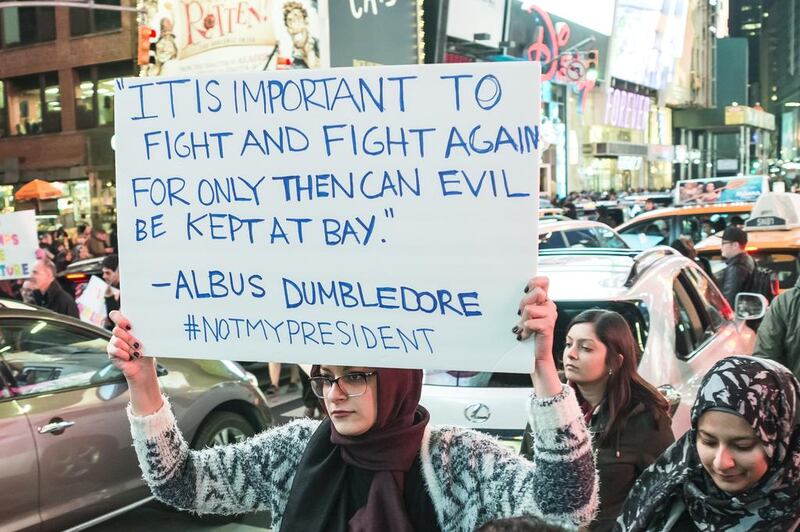CHARLOTTE // Like most recent Fridays, Donald Trump dominated last Friday's sermon at the Islamic Centre of North Carolina.
"We are getting free advertising on Fox News," says Abdulraouf Alkhawaldeh, the visiting speaker, raising weary laughs from his seated audience with his reference to the unflattering portrayal of Islam. Then comes the real message.
"It is up to us to use it," he says. "Do not let others define our faith, define who we are. Let the people know the truth."
This is not an easy time for America's Islamic community. But the imam's positive words reflect the deep resilience of Muslims in this city even as they ponder an uncertain future.
Donald Trump's presidential campaign promises included banning foreign Muslims entering the country or requiring those of Islamic faith to register as part of an antiterrorism drive. In the 10 days after the election, hate crime monitors at the Southern Poverty Law Centre recorded 49 Islamophobic incidents.
In much of the country, the deep sense of shock at the election result lingers on as members of minority groups fear Mr Trump's bombastic campaign has released forces that cannot be tamed.
North Carolina voted for Mr Trump this time around. As a southern state, its history is already marked by racism. Today, the Confederate flag - the banner of those parts of US that did not want to abolish slavery - still flies over some homes.
It flew last Saturday from cars in the small town of Roxboro last Saturday at a Ku Klux Klan rally to celebrate Mr Trump's victory.
Yet for all that, Charlotte's Muslims - estimated at about 20,000 in a city of one million - are sanguine about their prospects.
Mujtaba Mohammed, a criminal lawyer attending prayers during his lunch hour, said that everyone had fears but that he had faith in the US constitution and his fellow Americans.
"Everything happens for a reason," he said after prayers had finished. "We can't sit here crying and saying we wish we had a different president. We have to deal with the president we have. Like the imam said, we have to work with the times we are in."
Friday prayers at the Islamic centre are as packed as ever. About 200 men cram inside the prayer room inside the converted church. Cars line the street outside and latecomers listen to Imam Abdulraouf on a loudspeaker in the cold December air.
No one has been put off by the dangerous times, even though they have all heard accounts of harassment and intimidation both before and after the election.
A teacher at Charlotte Mecklenburg School has been suspended for allegedly abusing a five-year-old Muslim boy. An official complaint says the teacher repeatedly referred to the pupil as a "bad Muslim boy" and allowed other children to mock him. On one occasion, the teacher reportedly grabbed the boy by the neck and choked him.
School officials and district authorities say they are investigating the incidents and remain "committed to the safety and well-being of all students."
A seven-year-old Muslim boy was beaten by fellow pupils towards the end of the election campaign and his family have since returned to Pakistan, according to community leaders.
And last year three Muslims were shot dead in Chapel Hill, also in North Carolina. Controversially, the police decided not to treat the killings as a hate crime.
While Islamophobia is not new in American society, the latest incidents have heightened anxiety.
"It is our sisters who face the most trouble," said one worshipper, echoing the sentiments of many who say women who wear hijabs are the most visible members of their community.
On Thursday in New York, Yaswin Seweid, an 18-year-old Muslim woman, was allegedly abused by three drunk white men who shouted Donald Trump's name as they tried to pull the scarf off her head.
Jibril Hough, who converted to Islam at the age of 24 and acts as a spokesman for the mosque, said the sense of crisis reminded him of the atmosphere after September 11.
"I think it was a blessing in disguise because we created a lot of coalitions, made a lot of new friends and a lot of doors were opened. Some may have been closed for a moment but others opened," he said. "And I feel like a similar thing is about to take place."
Mr Hough said he had been to four meetings dedicated to opposing Donald Trump in two days. Different groups were forging contacts with Muslim leaders to oppose the threat to all of them. "It's mobilising people," he said.
"If Hillary Clinton had won people would have gone home and got fat and happy, and forgotten about things they are supposed to believe in. It may not have been as harsh, but I think she would have done some similar things - maybe worse in foreign policy."
So while much of America is still processing how a bombastic billionaire with no political experience can become president, Charlotte's Muslim leaders have begun plotting their way through the uncharted territory.
As Mr Mohammed, the lawyer, put it: "This is our country. We're not going anywhere."
foreign.desk@thenational.ae
US Muslim communities resilient as they face uncertain future
Despite some early negative signs, Muslims in America are resilient enough to deal with the forces unleashed by the arrival of Donald Trump.

Editor's picks
More from the national




